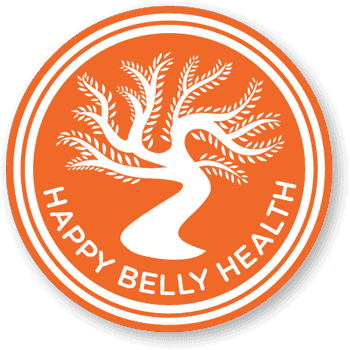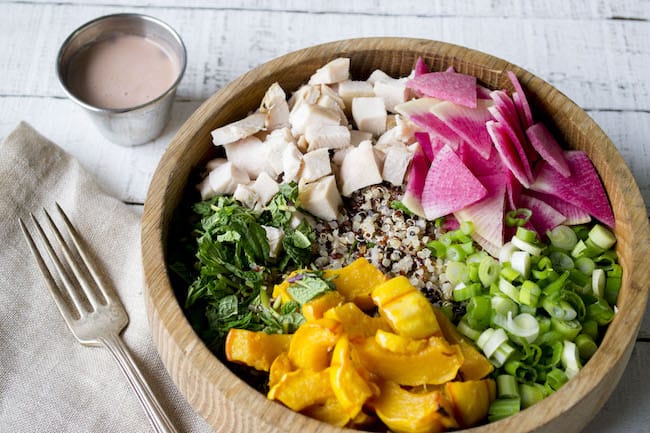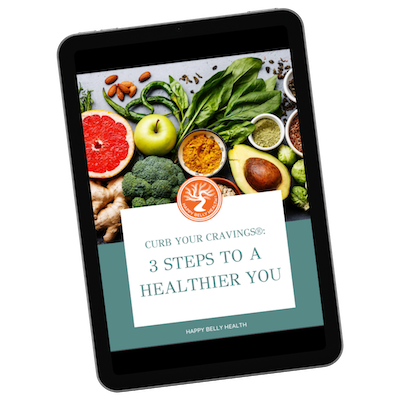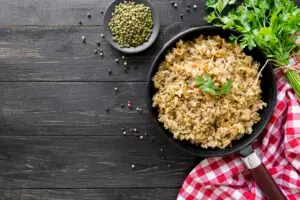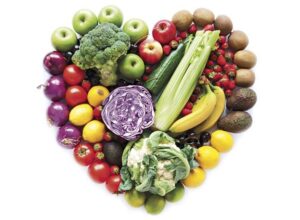Hi, I’m Shanti, Owner of Happy Belly Health®
At Happy Belly Health®, we specialize in functional medicine health coaching focused on weight loss and digestion.
The Art of Seasonal Cooking
There’s something magical when chefs—whether at home or in a professional kitchen—create dishes that explore a variety of colors, textures, and shapes. Our friends at Luke’s Local, chefs Paula McDade and Samuel Adams, have crafted two standout dishes on this week’s menu that truly let the season shine:
Butter Lettuce and Squash Blossom Salad
- Tender butter lettuce greens
- Golden yellow squash blossoms
- Organic strawberries
- Pickled red onions
- Toasted pumpkin seeds
- Drizzled in house-made strawberry balsamic vinaigrette
Rainbow Quinoa Bowl with Grilled Chicken and Summer Squash
- Grain bowl with rainbow quinoa
- Grilled chicken
- Summer squash
- Sherry vinaigrette
- Served on a bed of baby spinach
- Garnished with watermelon radish, pickled carrots, and raw shaved summer squash
Nutrient Variety: The Key to Health
While these entrees are sure to delight your senses, I’m particularly interested in how nutrient-dense they are. A variety of ingredients means a variety of nutrients. If we stick to the same old Cobb salad, we miss out on the abundance of nutrients that seasonal eating offers. Summer brings a wealth of fruits and colorful vegetables, all rich in vitamins, minerals, and antioxidants:
- Red, purple, and blue foods: High in antioxidants
- Orange and yellow foods: Rich in beta-carotenes
- Deep leafy greens: Packed with calcium and vitamin A
The Power of Ingredients
The “Butter Lettuce and Squash Blossom Salad” is not just delicious—it’s a nutrient powerhouse. Strawberries add a low-sugar, sweet punch packed with vitamin C and antioxidants, while pumpkin seeds bring nutty sweetness, crunchy texture, and a boost of magnesium—one of our nation’s top three deficiencies.
Curb Your Cravings®
If you’re like me and have a sweet tooth, fresh seasonal fruits in your salads can help curb cravings for refined sugars, keeping you away from the 4pm candy grab and late-night ice cream temptation.
Boosting Your Salad’s Nutritional Value
To replace croutons, consider adding crunchy seeds. They not only provide a satisfying crunch but also boost your salad with minerals like magnesium and calcium, along with extra protein, fiber, and healthy fats that help keep you full longer.
Making Salads Satisfying
If the thought of a salad as a meal leaves you worried you’ll still be hungry, you’re not alone. Many people feel this way. Before reaching for a sandwich or wrap, consider giving your salad some “staying power” by adding root vegetables like roasted butternut squash and quinoa.
If you’re still hungry, it may simply mean your body needs more nutrients. Here’s what you can do:
- Add healthy fats like avocado or olives
- Include seeds or nuts
- Go heavy on the olive oil dressing
- Chew well to aid digestion
Trying Luke’s Local’s “Quinoa Bowl” is a great way to enjoy a denser, more satisfying salad with plenty of vegetables and protein from the quinoa.
Nutrient Density Over Restriction
The idea is to move away from food restriction and dieting and focus on nutrient density, color, variety, and satisfaction. Your food should taste delicious and be a pleasure to eat.
Enjoy!
P.S. If you’re interested in learning more about health coaching and how we can help you, contact us here to schedule a free 15-minute chat. We look forward to supporting you.
Supporting Local Business
The folks at Luke’s Local have partnered with us to create Happy Belly Health® approved meals. They’re all about helping busy people eat well, just like we are. Order exactly what you want today (groceries, flowers, chef-prepared, and HBH-approved meals) and they’ll deliver it tomorrow. No membership or delivery charges. Receive a discount with code:
HAPPYBELLYHEALTH10 (We don’t receive any kickbacks for your orders; we just like supporting good local businesses that care about your health.)
